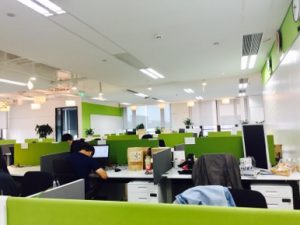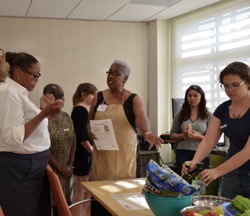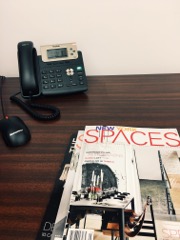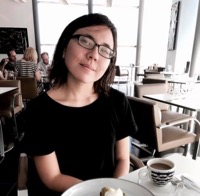Name: Jessie Junxuan Chu
Class Year: 2019
Major: Mathematics
Hometown: Yantai, China
Internship Placement: SAP China
Job Title: Intern at Customer Development Executive SHA T2
Location: Shanghai

What’s happening at your internship?
As an intern student, I’m working as a software tester who tests the programs and tests cases for my team. Software developers write new code every day, and as a tester, I’m responsible for checking errors in their programs. Usually we start our work day by having a meeting together, talking about the progress of our teamwork and making plans for our future work. Everybody ought to report what part of the work they finished yesterday and what they will do by the end of the day. As a software tester, I’m instructed by different developers for different programs in the morning. Before we are dismissed, I write a test report in English for both the developers and the team manager. Sometimes I help the incoming software developers set up their VPN and working systems on their computers, getting more chances to talk to people that I am not familiar with. When I am not assigned tasks from developers, I continue reading the computer language textbook and writing my programs on test systems.
I’m learning new material every day and slowly getting used to the working environment. For the first week of my internship, I basically read books about the computing language exclusive to SAP and explored their internal websites. I remember there was an online global meeting prepared for the new hired employees, and I saw people from other countries leave comments. Most of the comments were about their new jobs and about the company, curious about the past and the future of their job. Those comments gave me a sense that nearly every new worker had similar concerns about their new jobs. Meanwhile, I started to get in touch with my teammates. They helped me set up my Vietnamese VPN and sent me instructions about our complicated working system and coding language. Even though I was not in charge of software development, I had to differentiate specific symbols internal for company from error messages.
I started to write my own code in the second week and by the end of the second week, my teammates handed tasks to me. The first task was simple but exhausting. I did data configuration and created test cases according to one specific template. When there was no detailed data given to me in the template, I had to create my own data. Data could not be created without knowledge of house estate. I searched a lot online and made sure my data was reasonable. From the third week till now, I tested the codes provided by developers and wrote feedbacks to our team. After my test, developers would debug their programs and release them to Vietnamese clients. For most of the time, the tests were complicated and I sometimes even messed up my test cases. Luckily, after I found one peculiar spot in the program, one developer could help fix the problem as soon as possible, which sped up the progress of our team work. I also did some seemingly trivial but essential work for my teammates, such as building up test systems in their computers and requesting snacks during their working hours. My managers told me that for the second half of my internship, I would prepare slides for meetings and edit articles for their global publication.
Why did you apply for this internship?
First of all, I am going to declare a minor in computer science, and I am fascinated to work in an intelligence technology company before I take on my internship. I only finished the first year of my computer science study, and I’m not good at coding. By applying for this internship, I hope I can improve my coding and alleviate the struggle that I might face in the next two years.
Secondly, I’m looking forward to attending business school after I graduate from college. SAP is not only a company about intelligence technology, but about business. It has marketing and management departments that promote their software to other huge companies. Also, the management team have to negotiate with their customers, perceiving what kind of software design customers want. Sometimes management team has to communicate with customers to soothe their worries and suspicions about our development team, especially when numerous bugs appear in the program. We hold meetings with management team every morning. After the meeting, the management team supervises us, tracking our progress and giving us some suggestions. The interactions with the management team give me a glimpse of my potential future job.
Also, I attended a global meeting about female computer science programmers in New Town Square SAP Labs. The cozy working environment appealed me to apply for an internship at SAP. Following my earnest passion, I chose to stay at SAP in Shanghai this summer and get familiar with the complicated working environment. After this summer, I plan to get a job in the marketing or management team after I graduate from college.
The last reason that I applied for this internship is to satisfy my curiosity about IT workers. I heard some rumors that described the general personalities about IT workers, and I was interested to know if it is true or not. Clearly, most of the rumors are true — IT workers are always stressed about their codes, and the inequality of gender is true in IT industry (it might be affected by the specific department.). IT workers have to produce something that customers demand and to fix the errors that appear in their program. For all programmers, they wish that their programs could pass the all the test cases. However, such thing barely happens in real life. Developers in my team usually fix their codes for more than 50 times. Old error are fixed, but new errors appear, which stresses all of the programmers. As a tester, I am empathetic about their situations, but all I can do is to find new errors in their programs, which adds more burden on their shoulders.
Can you give us three adjectives and three nouns that describe your internship experience?
Stable schedule, well-planned (daily) tasks, and bilingual (working) environment.









